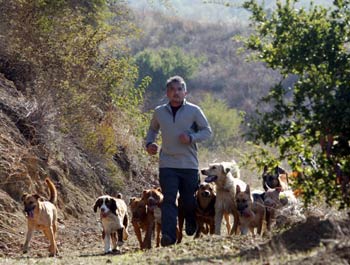Cesar's Way: The Natural, Everyday Guide to Understanding & Correcting Common Dog Problems
Fans of the National Geographic Channel's The Dog Whisperer with Cesar Millan will be grateful for Cesar's Way, an accessible guide to help new and current dog owners better understand the needs of their beloved pets. If you are not yet a fan, try to catch a couple of episodes of the remarkable show--you will be amazed, impressed, and motivated to create a healthier, more fulfilling relationship with your dog. In Cesar's Way, Cesar explains that dogs are not complicated, and despite what various owners think--not human. They rely on three key elements in their lives: exercise, discipline, and affection (in that order). "Problem dogs" can be attributed to "problem owners," owners who don't understand and misinterpret their dog's behavior. Cesar's Way is really a training program for dog owners, with chapters devoted to understanding the "power of the pack," taking responsibility for "how we screw up our dogs," and learning how to manage aggression. Cesar's book (a must-have for new and old dog owners) moves beyond basic obedience school techniques, and teaches owners how to change unwanted behavior by better understanding their "best friends." --Daphne Durham
 Watch the video |
 Watch Cesar in action in this clip of The Dog Whisperer with Cesar Millan, courtesy of the National Geographic Channel. Or, tune in on Friday nights, at 8 p.m. ET/PT.
Watch Cesar in action in this clip of The Dog Whisperer with Cesar Millan, courtesy of the National Geographic Channel. Or, tune in on Friday nights, at 8 p.m. ET/PT.
 1. Make sure your dog is spayed or neutered, has all her shots, and is in good health. Under no circumstances should you bring a sick dog to a dog park!
1. Make sure your dog is spayed or neutered, has all her shots, and is in good health. Under no circumstances should you bring a sick dog to a dog park!